
memori
Open-Source Memory Engine for LLMs, AI Agents & Multi-Agent Systems
Stars: 1099
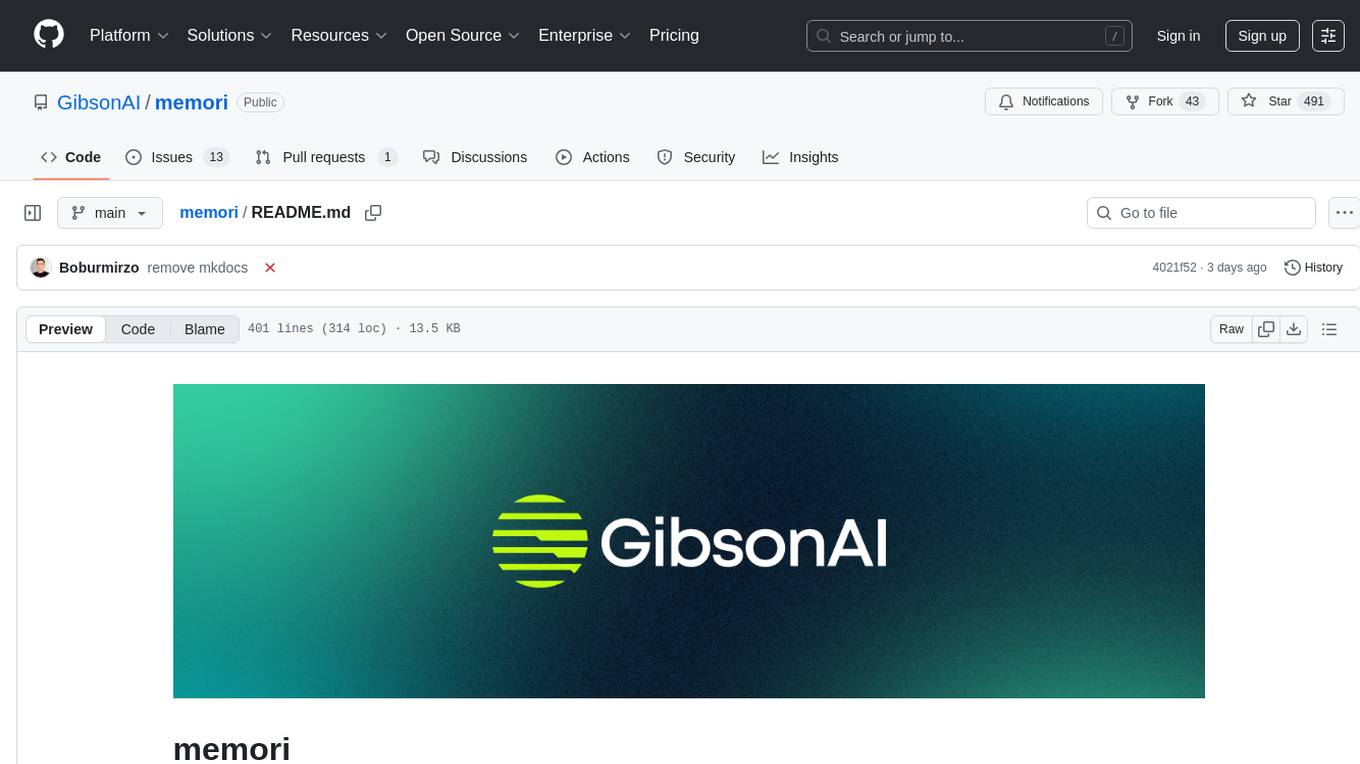
Memori is a lightweight and user-friendly memory management tool for developers. It helps in tracking memory usage, detecting memory leaks, and optimizing memory allocation in software projects. With Memori, developers can easily monitor and analyze memory consumption to improve the performance and stability of their applications. The tool provides detailed insights into memory usage patterns and helps in identifying areas for optimization. Memori is designed to be easy to integrate into existing projects and offers a simple yet powerful interface for managing memory resources effectively.
README:
Open-Source Memory Engine for LLMs, AI Agents & Multi-Agent Systems
From Postgres to MySQL, Memori plugs into the SQL databases you already use. Simple setup, infinite scale without new infrastructure.
- Second-memory for all your LLM work - Never repeat context again
- Dual-mode memory injection - Conscious short-term memory + Auto intelligent search
- Flexible database connections - SQLite, PostgreSQL, MySQL support
- Pydantic-based intelligence - Structured memory processing with validation
- Simple, reliable architecture - Just works out of the box
Install Memori:
pip install memorisdk- Install OpenAI:
pip install openai- Set OpenAI API Key:
export OPENAI_API_KEY="sk-your-openai-key-here"- Run this Python script:
from memori import Memori
from openai import OpenAI
# Initialize OpenAI client
openai_client = OpenAI()
# Initialize memory
memori = Memori(conscious_ingest=True)
memori.enable()
print("=== First Conversation - Establishing Context ===")
response1 = openai_client.chat.completions.create(
model="gpt-4o-mini",
messages=[{
"role": "user",
"content": "I'm working on a Python FastAPI project"
}]
)
print("Assistant:", response1.choices[0].message.content)
print("\n" + "="*50)
print("=== Second Conversation - Memory Provides Context ===")
response2 = openai_client.chat.completions.create(
model="gpt-4o-mini",
messages=[{
"role": "user",
"content": "Help me add user authentication"
}]
)
print("Assistant:", response2.choices[0].message.content)
print("\n💡 Notice: Memori automatically knows about your FastAPI Python project!")By default, Memori uses in-memory SQLite database. Get FREE serverless database instance in GibsonAI platform.
🚀 Ready to explore more?
- 📖 Examples - Basic usage patterns and code samples
- 🔌 Framework Integrations - LangChain, Agno & CrewAI examples
- 🎮 Interactive Demos - Live applications & tutorials
office_work.enable() # Records ALL LLM conversations automatically- Entity Extraction: Extracts people, technologies, projects
- Smart Categorization: Facts, preferences, skills, rules
- Pydantic Validation: Structured, type-safe memory storage
conscious_ingest=True # One-shot short-term memory injection- At Startup: Conscious agent analyzes long-term memory patterns
- Memory Promotion: Moves essential conversations to short-term storage
- One-Shot Injection: Injects working memory once at conversation start
- Like Human Short-Term Memory: Names, current projects, preferences readily available
auto_ingest=True # Continuous intelligent memory retrieval- Every LLM Call: Retrieval agent analyzes user query intelligently
- Full Database Search: Searches through entire memory database
- Context-Aware: Injects relevant memories based on current conversation
- Performance Optimized: Caching, async processing, background threads
# Mimics human conscious memory - essential info readily available
memori = Memori(
database_connect="sqlite:///my_memory.db",
conscious_ingest=True, # 🧠 Short-term working memory
openai_api_key="sk-..."
)How Conscious Mode Works:
- At Startup: Conscious agent analyzes long-term memory patterns
- Essential Selection: Promotes 5-10 most important conversations to short-term
- One-Shot Injection: Injects this working memory once at conversation start
- No Repeats: Won't inject again during the same session
# Searches entire database dynamically based on user queries
memori = Memori(
database_connect="sqlite:///my_memory.db",
auto_ingest=True, # 🔍 Smart database search
openai_api_key="sk-..."
)How Auto Mode Works:
- Every LLM Call: Retrieval agent analyzes user input
- Query Planning: Uses AI to understand what memories are needed
- Smart Search: Searches through entire database (short-term + long-term)
- Context Injection: Injects 3-5 most relevant memories per call
# Get both working memory AND dynamic search
memori = Memori(
conscious_ingest=True, # Working memory once
auto_ingest=True, # Dynamic search every call
openai_api_key="sk-..."
)- Memory Agent - Processes every conversation with Pydantic structured outputs
- Conscious Agent - Analyzes patterns, promotes long-term → short-term memories
- Retrieval Agent - Intelligently searches and selects relevant context
- 👤 Personal Identity: Your name, role, location, basic info
- ❤️ Preferences & Habits: What you like, work patterns, routines
- 🛠️ Skills & Tools: Technologies you use, expertise areas
- 📊 Current Projects: Ongoing work, learning goals
- 🤝 Relationships: Important people, colleagues, connections
- 🔄 Repeated References: Information you mention frequently
| Type | Purpose | Example | Auto-Promoted |
|---|---|---|---|
| Facts | Objective information | "I use PostgreSQL for databases" | ✅ High frequency |
| Preferences | User choices | "I prefer clean, readable code" | ✅ Personal identity |
| Skills | Abilities & knowledge | "Experienced with FastAPI" | ✅ Expertise areas |
| Rules | Constraints & guidelines | "Always write tests first" | ✅ Work patterns |
| Context | Session information | "Working on e-commerce project" | ✅ Current projects |
from memori import Memori
# Conscious mode - Short-term working memory
memori = Memori(
database_connect="sqlite:///my_memory.db",
template="basic",
conscious_ingest=True, # One-shot context injection
openai_api_key="sk-..."
)
# Auto mode - Dynamic database search
memori = Memori(
database_connect="sqlite:///my_memory.db",
auto_ingest=True, # Continuous memory retrieval
openai_api_key="sk-..."
)
# Combined mode - Best of both worlds
memori = Memori(
conscious_ingest=True, # Working memory +
auto_ingest=True, # Dynamic search
openai_api_key="sk-..."
)from memori import Memori, ConfigManager
# Load from memori.json or environment
config = ConfigManager()
config.auto_load()
memori = Memori()
memori.enable()Create memori.json:
{
"database": {
"connection_string": "postgresql://user:pass@localhost/memori"
},
"agents": {
"openai_api_key": "sk-...",
"conscious_ingest": true,
"auto_ingest": false
},
"memory": {
"namespace": "my_project",
"retention_policy": "30_days"
}
}Works with ANY LLM library:
memori.enable() # Enable universal recording
# OpenAI
from openai import OpenAI
client = OpenAI()
client.chat.completions.create(...)
# LiteLLM
from litellm import completion
completion(model="gpt-4", messages=[...])
# Anthropic
import anthropic
client = anthropic.Anthropic()
client.messages.create(...)
# All automatically recorded and contextualized!# Automatic analysis every 6 hours (when conscious_ingest=True)
memori.enable() # Starts background conscious agent
# Manual analysis trigger
memori.trigger_conscious_analysis()
# Get essential conversations
essential = memori.get_essential_conversations(limit=5)from memori.tools import create_memory_tool
# Create memory search tool for your LLM
memory_tool = create_memory_tool(memori)
# Use in function calling
tools = [memory_tool]
completion(model="gpt-4", messages=[...], tools=tools)# Get relevant context for a query
context = memori.retrieve_context("Python testing", limit=5)
# Returns: 3 essential + 2 specific memories
# Search by category
skills = memori.search_memories_by_category("skill", limit=10)
# Get memory statistics
stats = memori.get_memory_stats()-- Core tables created automatically
chat_history # All conversations
short_term_memory # Recent context (expires)
long_term_memory # Permanent insights
rules_memory # User preferences
memory_entities # Extracted entities
memory_relationships # Entity connectionsmemori/
├── core/ # Main Memori class, database manager
├── agents/ # Memory processing with Pydantic
├── database/ # SQLite/PostgreSQL/MySQL support
├── integrations/ # LiteLLM, OpenAI, Anthropic
├── config/ # Configuration management
├── utils/ # Helpers, validation, logging
└── tools/ # Memory search tools
- Basic Usage - Simple memory setup with conscious ingestion
- Personal Assistant - AI assistant with intelligent memory
- Memory Retrieval - Function calling with memory tools
- Advanced Config - Production configuration
- Interactive Demo - Live conscious ingestion showcase
- Simple Multi-User - Basic demonstration of user memory isolation with namespaces
- FastAPI Multi-User App - Full-featured REST API with Swagger UI for testing multi-user functionality
Memori works seamlessly with popular AI frameworks:
| Framework | Description | Example |
|---|---|---|
| AgentOps | Track and monitor Memori memory operations with comprehensive observability | Memory operation tracking with AgentOps analytics |
| Agno | Memory-enhanced agent framework integration with persistent conversations | Simple chat agent with memory search |
| AWS Strands | Professional development coach with Strands SDK and persistent memory | Career coaching agent with goal tracking |
| Azure AI Foundry | Azure AI Foundry agents with persistent memory across conversations | Enterprise AI agents with Azure integration |
| CamelAI | Multi-agent communication framework with automatic memory recording and retrieval | Memory-enhanced chat agents with conversation continuity |
| CrewAI | Multi-agent system with shared memory across agent interactions | Collaborative agents with memory |
| Digital Ocean AI | Memory-enhanced customer support using Digital Ocean's AI platform | Customer support assistant with conversation history |
| LangChain | Enterprise-grade agent framework with advanced memory integration | AI assistant with LangChain tools and memory |
| OpenAI Agent | Memory-enhanced OpenAI Agent with function calling and user preference tracking | Interactive assistant with memory search and user info storage |
| Swarms | Multi-agent system framework with persistent memory capabilities | Memory-enhanced Swarms agents with auto/conscious ingestion |
Explore Memori's capabilities through these interactive demonstrations:
| Title | Description | Tools Used | Live Demo |
|---|---|---|---|
| 🌟 Personal Diary Assistant | A comprehensive diary assistant with mood tracking, pattern analysis, and personalized recommendations. | Streamlit, LiteLLM, OpenAI, SQLite | Run Demo |
| 🌍 Travel Planner Agent | Intelligent travel planning with CrewAI agents, real-time web search, and memory-based personalization. Plans complete itineraries with budget analysis. | CrewAI, Streamlit, OpenAI, SQLite | |
| 🧑🔬 Researcher Agent | Advanced AI research assistant with persistent memory, real-time web search, and comprehensive report generation. Builds upon previous research sessions. | Agno, Streamlit, OpenAI, ExaAI, SQLite | Run Demo |
- See CONTRIBUTING.md for development setup and guidelines.
- Community: Discord
MIT License - see LICENSE for details.
Made for developers who want their AI agents to remember and learn
For Tasks:
Click tags to check more tools for each tasksFor Jobs:
Alternative AI tools for memori
Similar Open Source Tools

memori
Memori is a lightweight and user-friendly memory management tool for developers. It helps in tracking memory usage, detecting memory leaks, and optimizing memory allocation in software projects. With Memori, developers can easily monitor and analyze memory consumption to improve the performance and stability of their applications. The tool provides detailed insights into memory usage patterns and helps in identifying areas for optimization. Memori is designed to be easy to integrate into existing projects and offers a simple yet powerful interface for managing memory resources effectively.
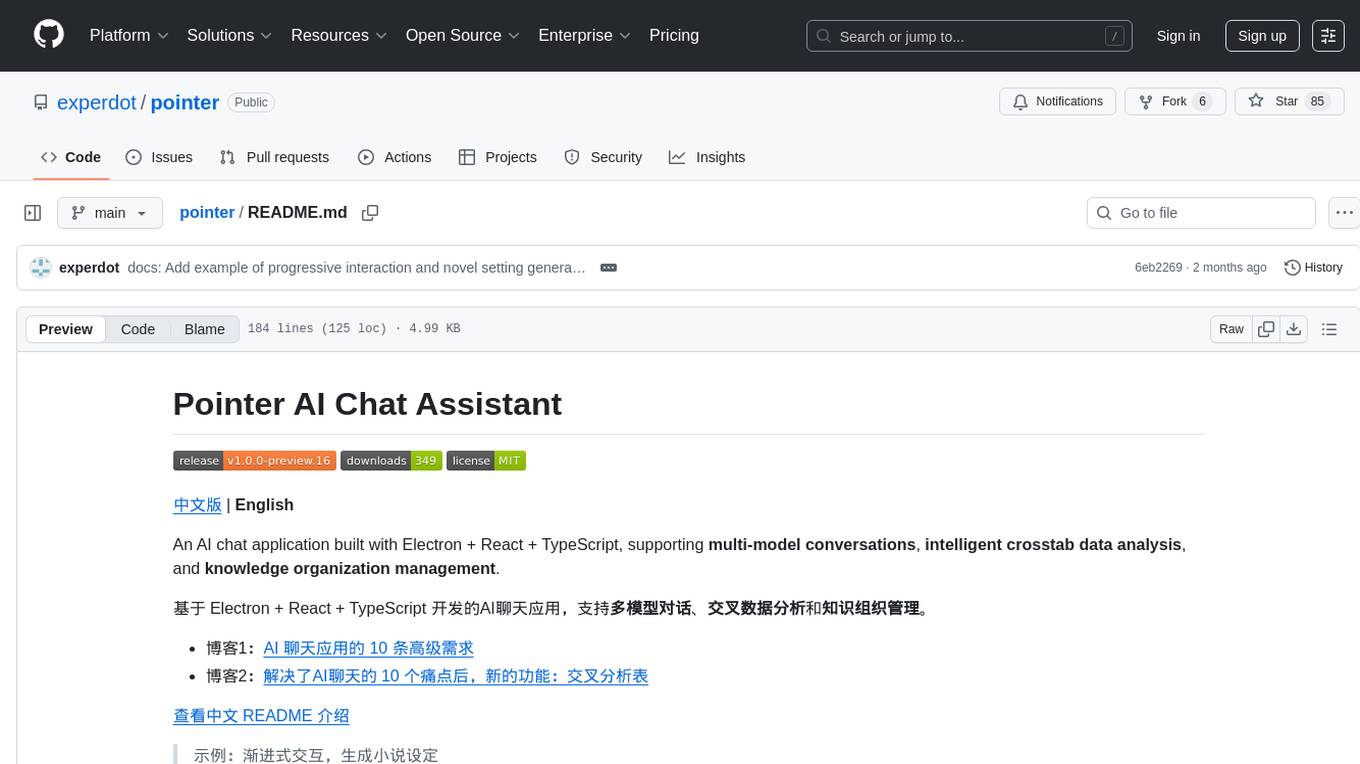
pointer
Pointer is a lightweight and efficient tool for analyzing and visualizing data structures in C and C++ programs. It provides a user-friendly interface to track memory allocations, pointer references, and data structures, helping developers to identify memory leaks, pointer errors, and optimize memory usage. With Pointer, users can easily navigate through complex data structures, visualize memory layouts, and debug pointer-related issues in their codebase. The tool offers interactive features such as memory snapshots, pointer tracking, and memory visualization, making it a valuable asset for C and C++ developers working on memory-intensive applications.
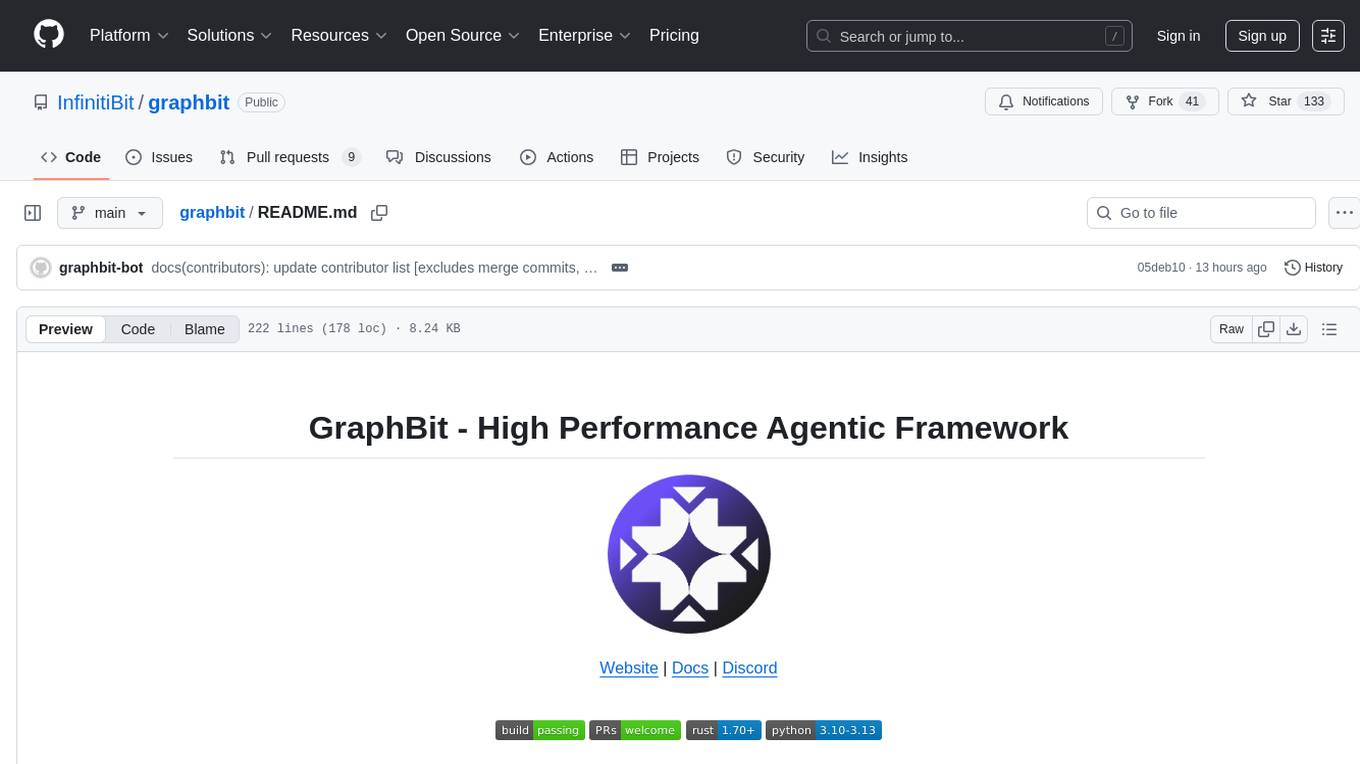
graphbit
GraphBit is an industry-grade agentic AI framework built for developers and AI teams that demand stability, scalability, and low resource usage. It is written in Rust for maximum performance and safety, delivering significantly lower CPU usage and memory footprint compared to leading alternatives. The framework is designed to run multi-agent workflows in parallel, persist memory across steps, recover from failures, and ensure 100% task success under load. With lightweight architecture, observability, and concurrency support, GraphBit is suitable for deployment in high-scale enterprise environments and low-resource edge scenarios.
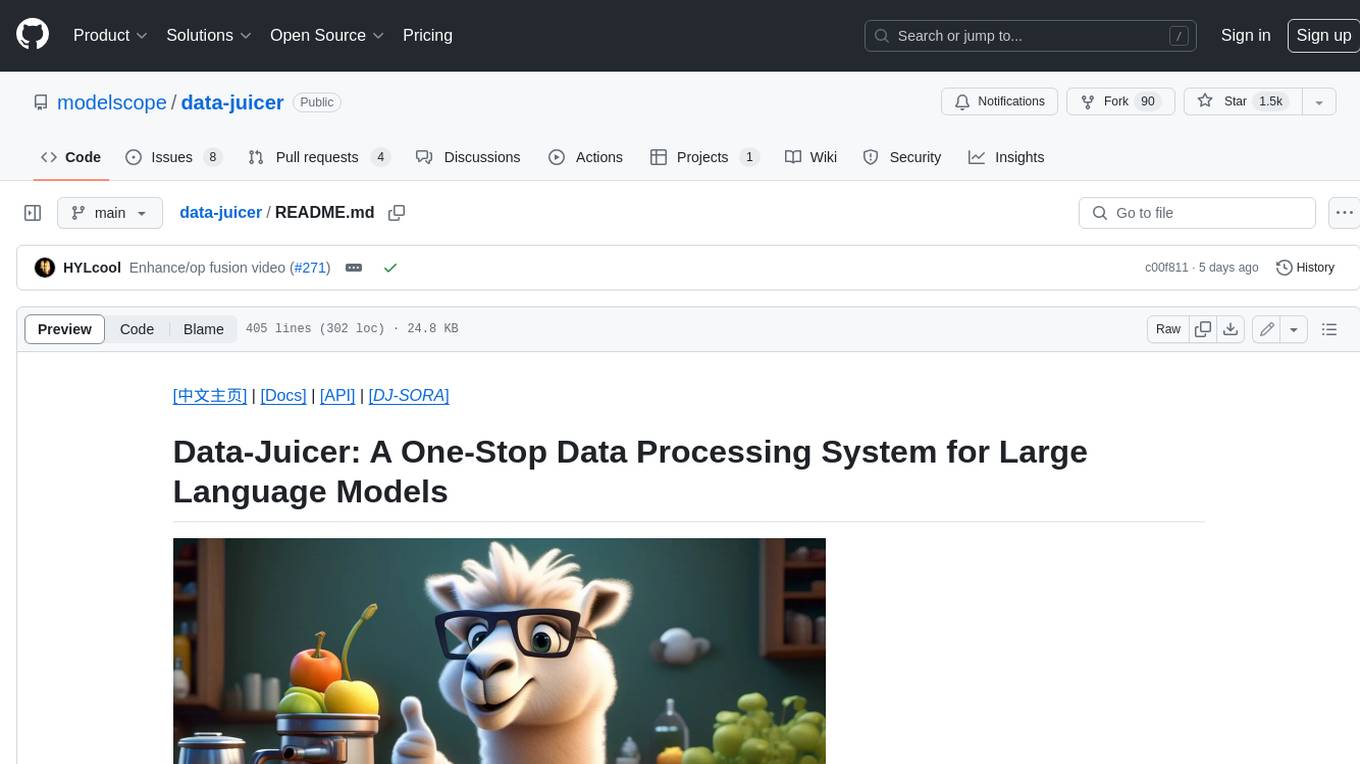
data-juicer
Data-Juicer is a one-stop data processing system to make data higher-quality, juicier, and more digestible for LLMs. It is a systematic & reusable library of 80+ core OPs, 20+ reusable config recipes, and 20+ feature-rich dedicated toolkits, designed to function independently of specific LLM datasets and processing pipelines. Data-Juicer allows detailed data analyses with an automated report generation feature for a deeper understanding of your dataset. Coupled with multi-dimension automatic evaluation capabilities, it supports a timely feedback loop at multiple stages in the LLM development process. Data-Juicer offers tens of pre-built data processing recipes for pre-training, fine-tuning, en, zh, and more scenarios. It provides a speedy data processing pipeline requiring less memory and CPU usage, optimized for maximum productivity. Data-Juicer is flexible & extensible, accommodating most types of data formats and allowing flexible combinations of OPs. It is designed for simplicity, with comprehensive documentation, easy start guides and demo configs, and intuitive configuration with simple adding/removing OPs from existing configs.
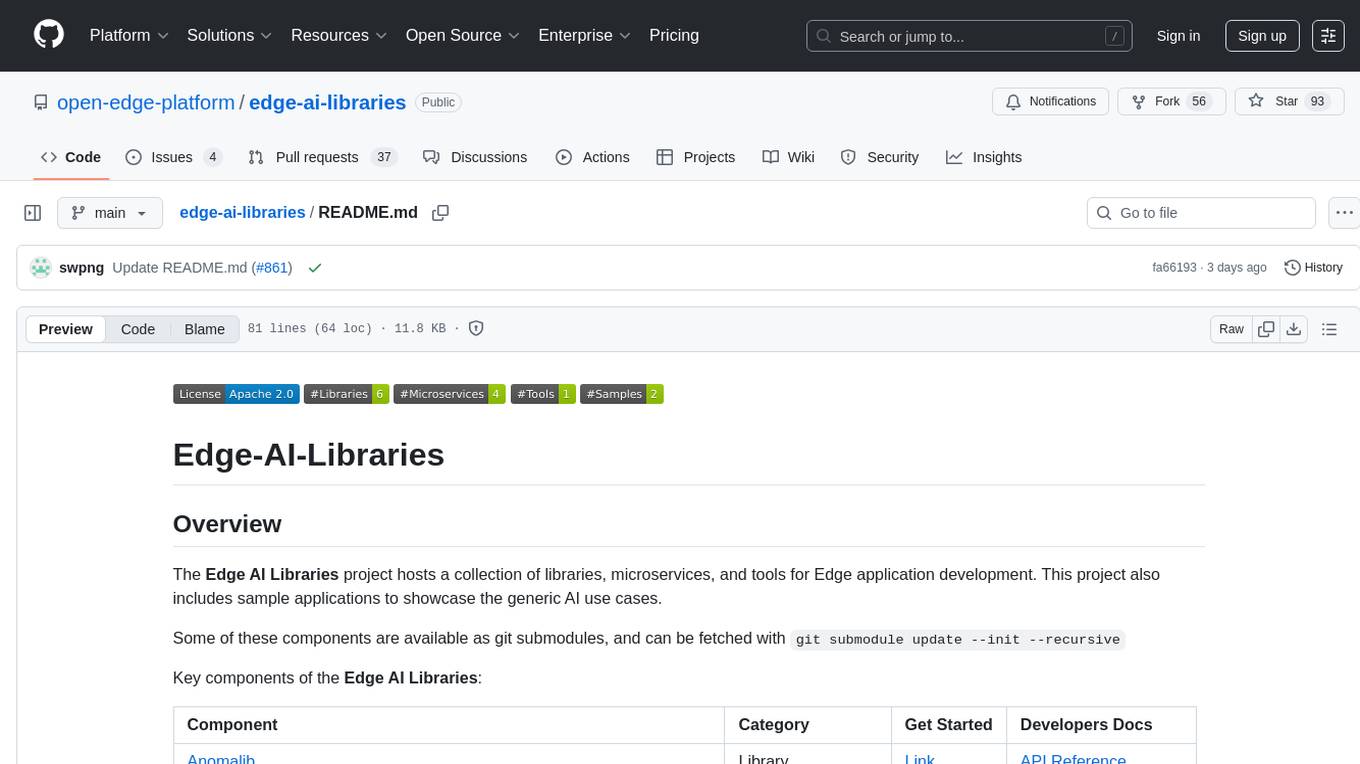
edge-ai-libraries
The Edge AI Libraries project is a collection of libraries, microservices, and tools for Edge application development. It includes sample applications showcasing generic AI use cases. Key components include Anomalib, Dataset Management Framework, Deep Learning Streamer, ECAT EnableKit, EtherCAT Masterstack, FLANN, OpenVINO toolkit, Audio Analyzer, ORB Extractor, PCL, PLCopen Servo, Real-time Data Agent, RTmotion, Audio Intelligence, Deep Learning Streamer Pipeline Server, Document Ingestion, Model Registry, Multimodal Embedding Serving, Time Series Analytics, Vector Retriever, Visual-Data Preparation, VLM Inference Serving, Intel Geti, Intel SceneScape, Visual Pipeline and Platform Evaluation Tool, Chat Question and Answer, Document Summarization, PLCopen Benchmark, PLCopen Databus, Video Search and Summarization, Isolation Forest Classifier, Random Forest Microservices. Visit sub-directories for instructions and guides.
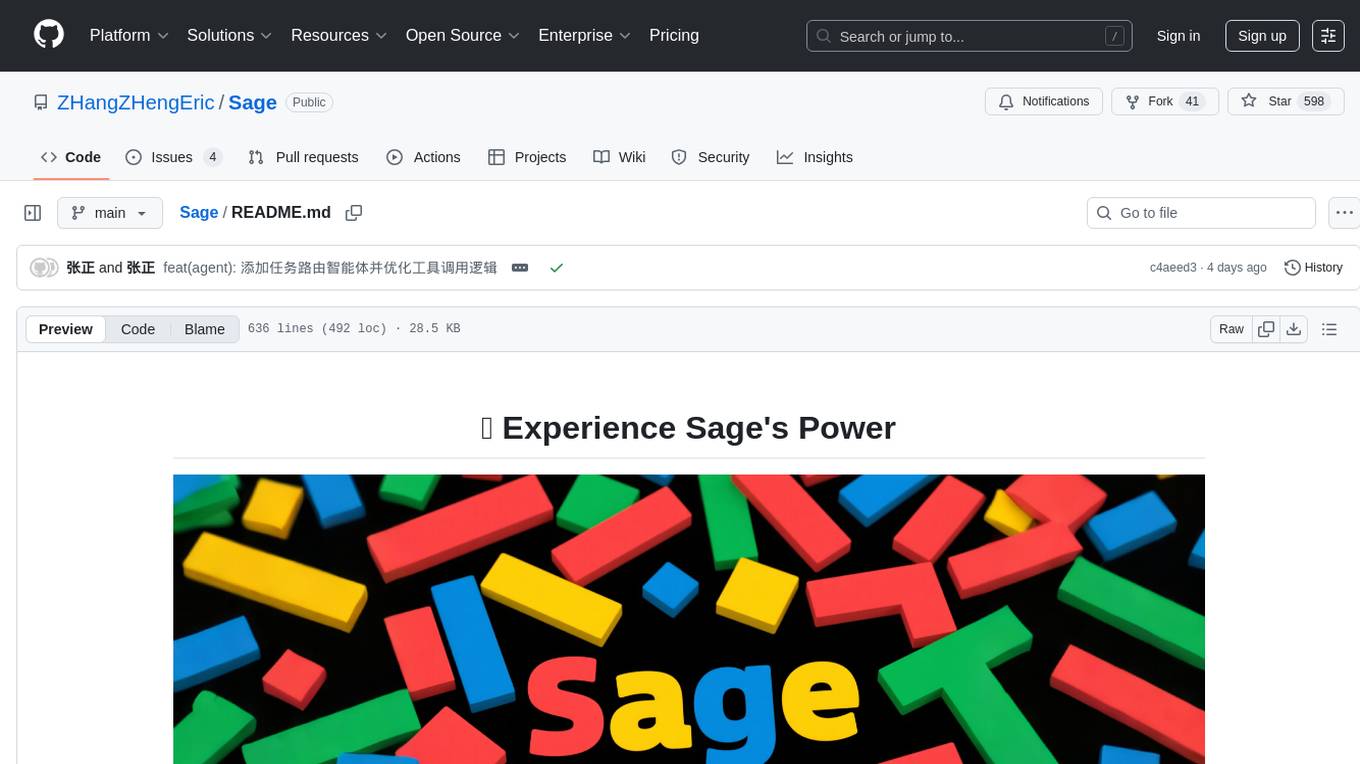
Sage
Sage is a production-ready, modular, and intelligent multi-agent orchestration framework for complex problem solving. It intelligently breaks down complex tasks into manageable subtasks through seamless agent collaboration. Sage provides Deep Research Mode for comprehensive analysis and Rapid Execution Mode for quick task completion. It offers features like intelligent task decomposition, agent orchestration, extensible tool system, dual execution modes, interactive web interface, advanced token tracking, rich configuration, developer-friendly APIs, and robust error recovery mechanisms. Sage supports custom workflows, multi-agent collaboration, custom agent development, agent flow orchestration, rule preferences system, message manager for smart token optimization, task manager for comprehensive state management, advanced file system operations, advanced tool system with plugin architecture, token usage & cost monitoring, and rich configuration system. It also includes real-time streaming & monitoring, advanced tool development, error handling & reliability, performance monitoring, MCP server integration, and security features.
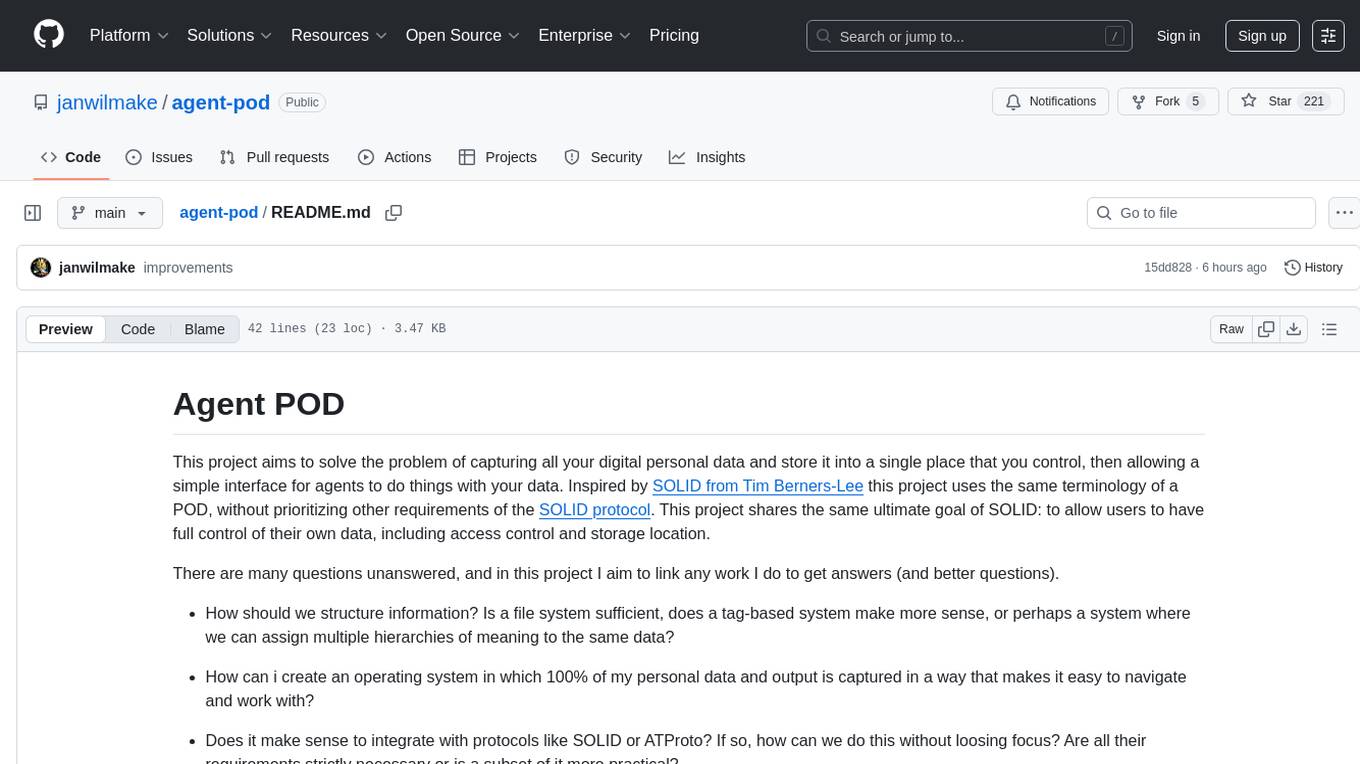
agent-pod
Agent POD is a project focused on capturing and storing personal digital data in a user-controlled environment, with the goal of enabling agents to interact with the data. It explores questions related to structuring information, creating an efficient data capture system, integrating with protocols like SOLID, and enabling data storage for groups. The project aims to transition from traditional data-storing apps to a system where personal data is owned and controlled by the user, facilitating the creation of 'solid-first' apps.
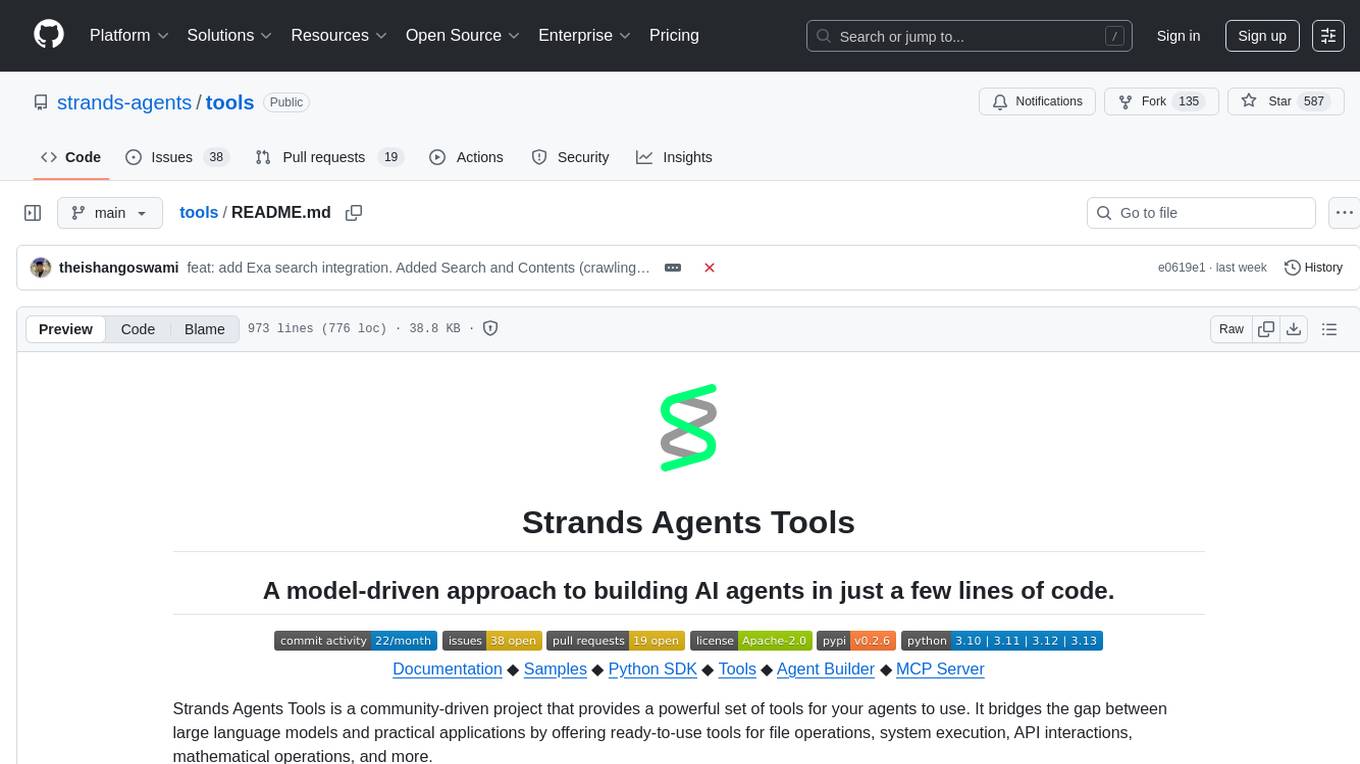
tools
Strands Agents Tools is a community-driven project that provides a powerful set of tools for your agents to use. It bridges the gap between large language models and practical applications by offering ready-to-use tools for file operations, system execution, API interactions, mathematical operations, and more. The tools cover a wide range of functionalities including file operations, shell integration, memory storage, web infrastructure, HTTP client, Slack client, Python execution, mathematical tools, AWS integration, image and video processing, audio output, environment management, task scheduling, advanced reasoning, swarm intelligence, dynamic MCP client, parallel tool execution, browser automation, diagram creation, RSS feed management, and computer automation.
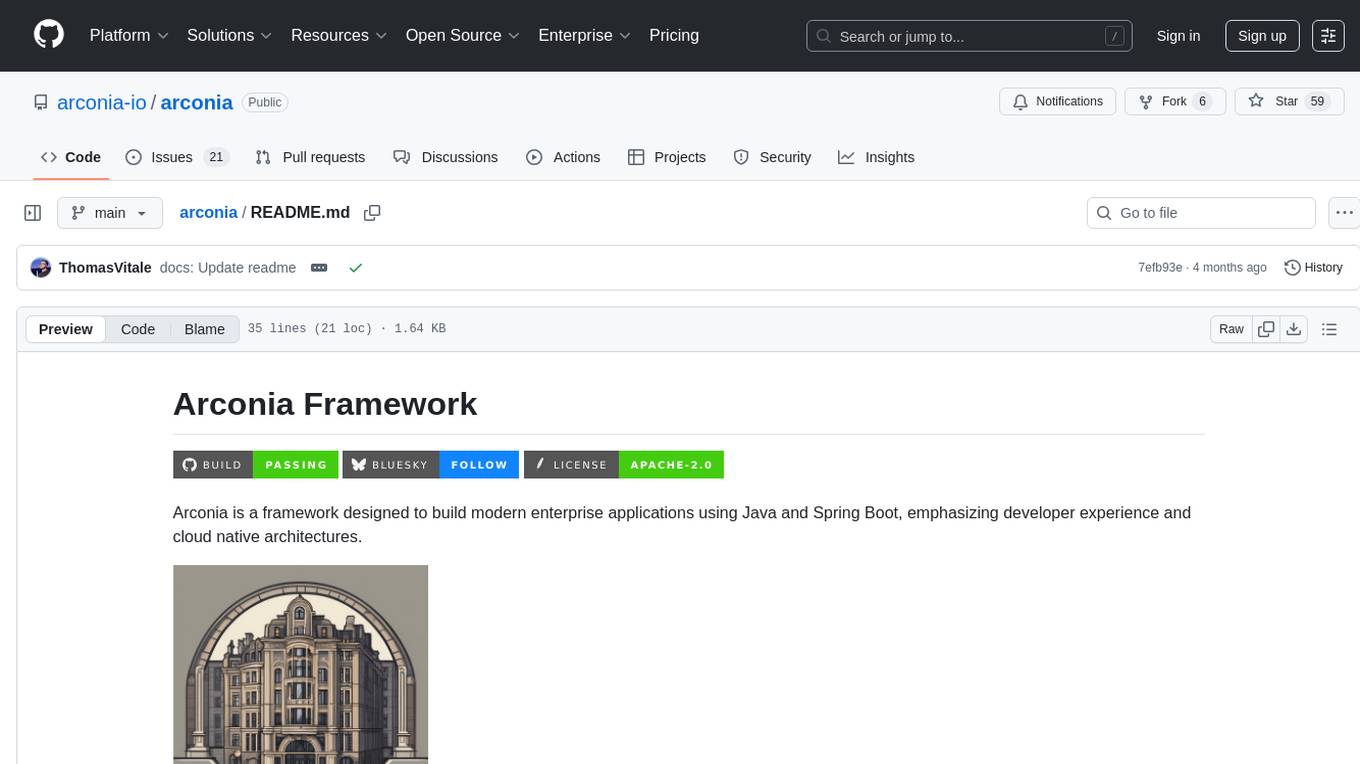
arconia
Arconia is a powerful open-source tool for managing and visualizing data in a user-friendly way. It provides a seamless experience for data analysts and scientists to explore, clean, and analyze datasets efficiently. With its intuitive interface and robust features, Arconia simplifies the process of data manipulation and visualization, making it an essential tool for anyone working with data.
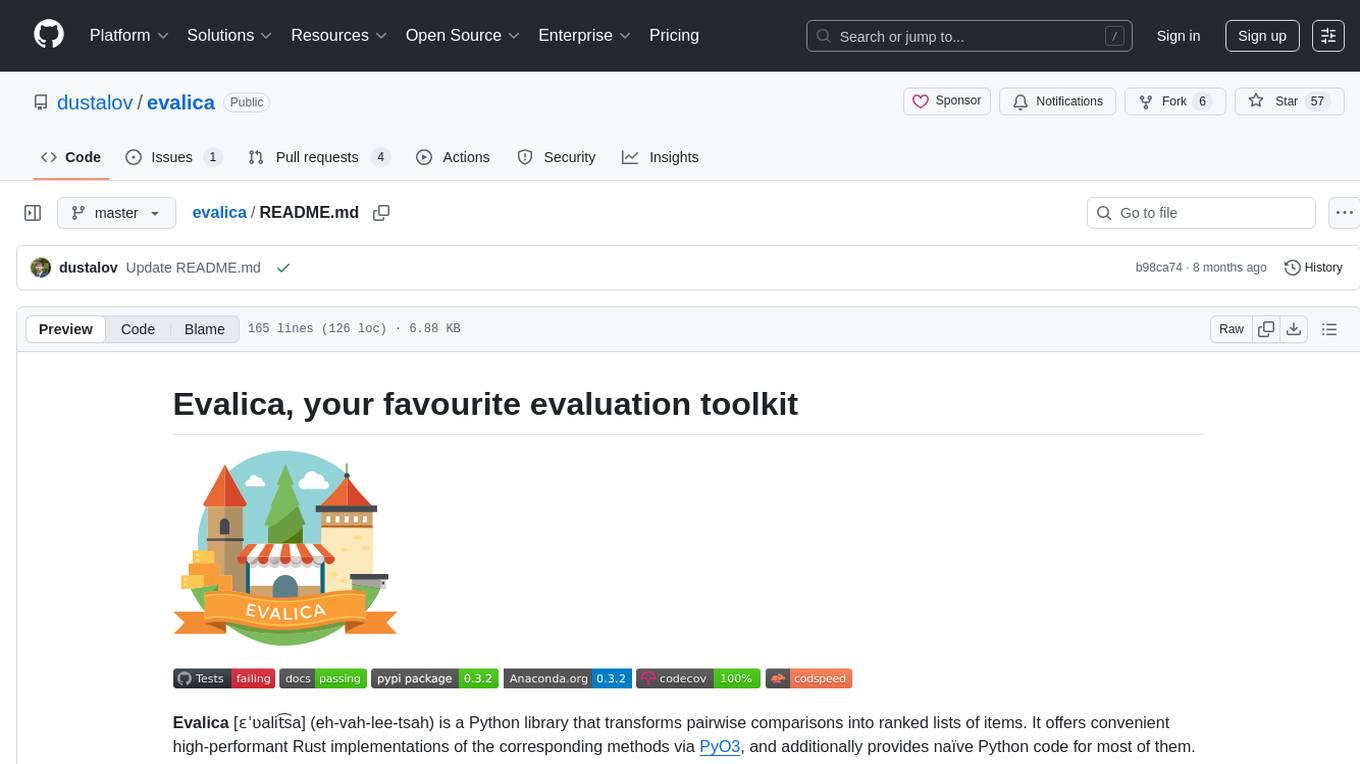
evalica
Evalica is a powerful tool for evaluating code quality and performance in software projects. It provides detailed insights and metrics to help developers identify areas for improvement and optimize their code. With support for multiple programming languages and frameworks, Evalica offers a comprehensive solution for code analysis and optimization. Whether you are a beginner looking to learn best practices or an experienced developer aiming to enhance your code quality, Evalica is the perfect tool for you.
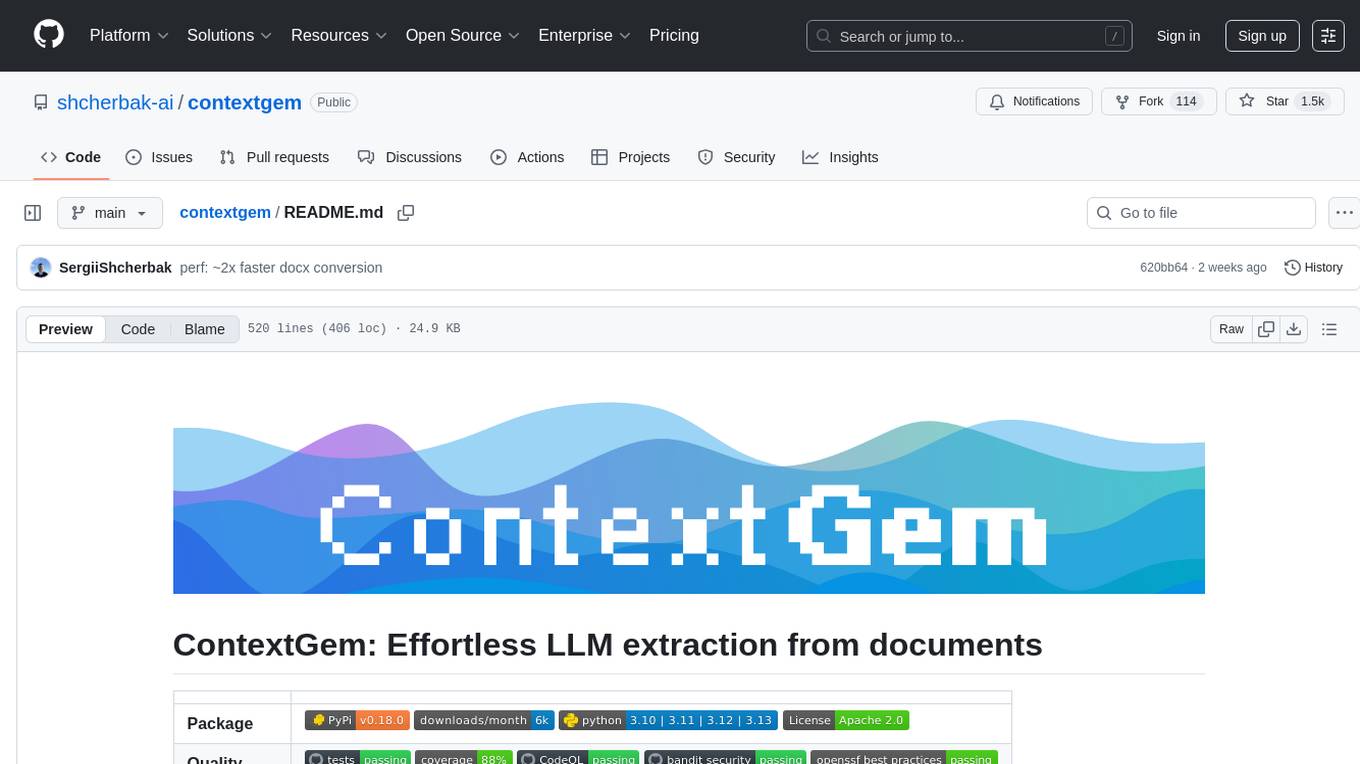
contextgem
Contextgem is a Ruby gem that provides a simple way to manage context-specific configurations in your Ruby applications. It allows you to define different configurations based on the context in which your application is running, such as development, testing, or production. This helps you keep your configuration settings organized and easily accessible, making it easier to maintain and update your application. With Contextgem, you can easily switch between different configurations without having to modify your code, making it a valuable tool for managing complex applications with multiple environments.

upgini
Upgini is an intelligent data search engine with a Python library that helps users find and add relevant features to their ML pipeline from various public, community, and premium external data sources. It automates the optimization of connected data sources by generating an optimal set of machine learning features using large language models, GraphNNs, and recurrent neural networks. The tool aims to simplify feature search and enrichment for external data to make it a standard approach in machine learning pipelines. It democratizes access to data sources for the data science community.
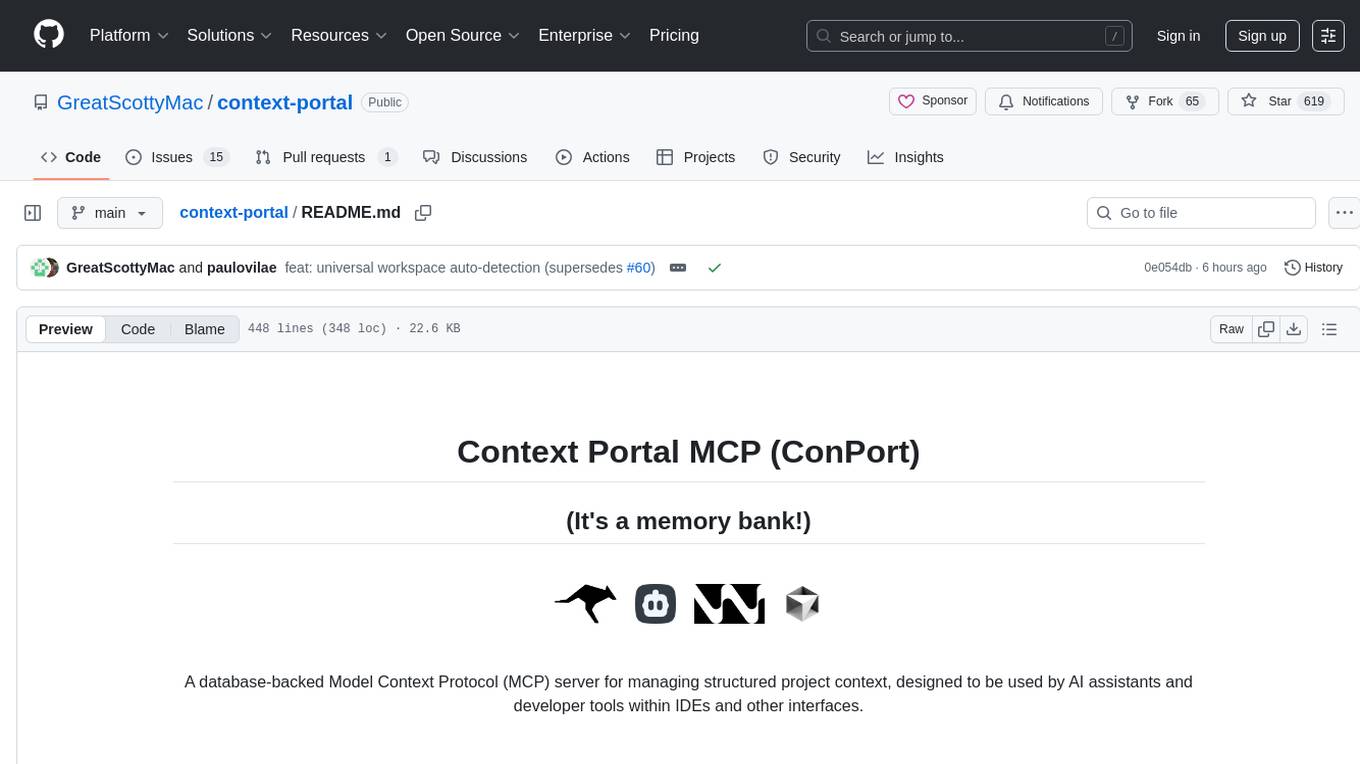
context-portal
Context-portal is a versatile tool for managing and visualizing data in a collaborative environment. It provides a user-friendly interface for organizing and sharing information, making it easy for teams to work together on projects. With features such as customizable dashboards, real-time updates, and seamless integration with popular data sources, Context-portal streamlines the data management process and enhances productivity. Whether you are a data analyst, project manager, or team leader, Context-portal offers a comprehensive solution for optimizing workflows and driving better decision-making.

koog
Koog is a Kotlin-based framework for building and running AI agents entirely in idiomatic Kotlin. It allows users to create agents that interact with tools, handle complex workflows, and communicate with users. Key features include pure Kotlin implementation, MCP integration, embedding capabilities, custom tool creation, ready-to-use components, intelligent history compression, powerful streaming API, persistent agent memory, comprehensive tracing, flexible graph workflows, modular feature system, scalable architecture, and multiplatform support.
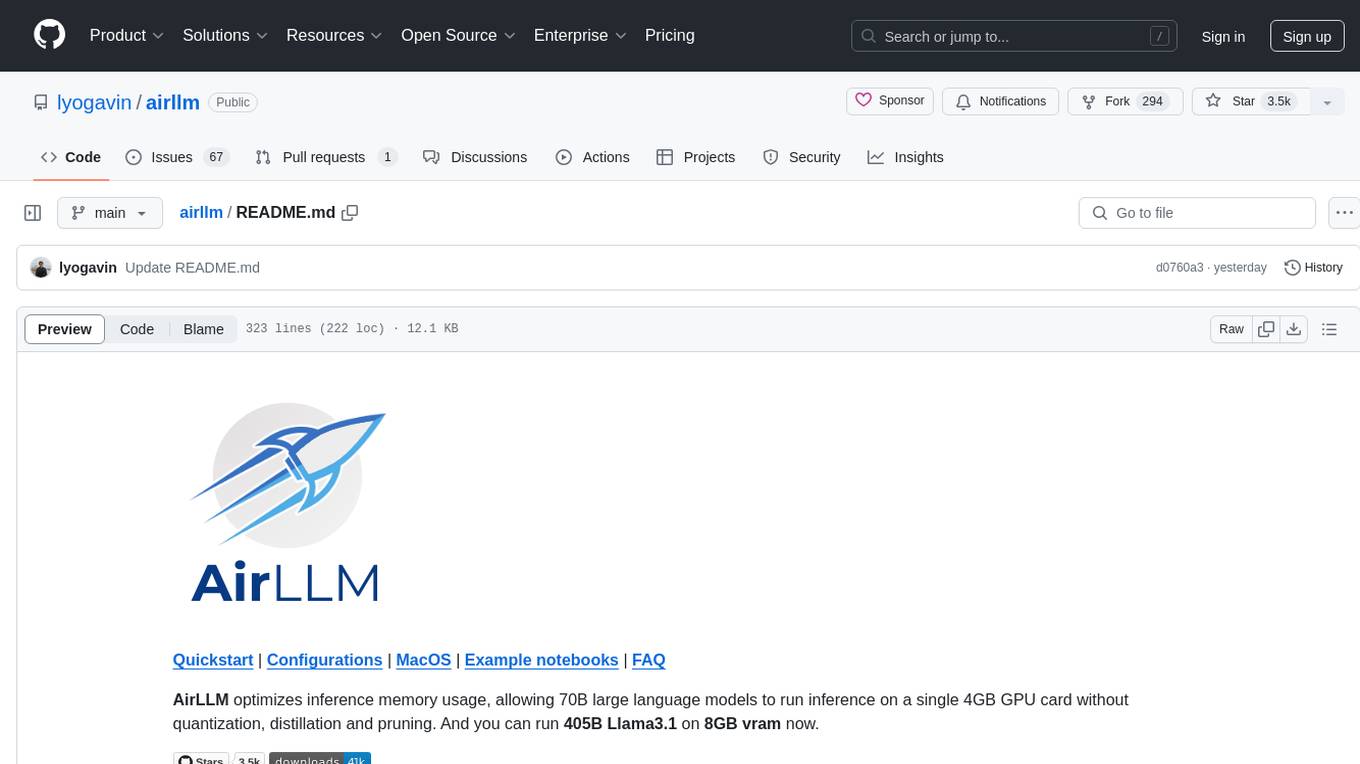
airllm
AirLLM is a tool that optimizes inference memory usage, enabling large language models to run on low-end GPUs without quantization, distillation, or pruning. It supports models like Llama3.1 on 8GB VRAM. The tool offers model compression for up to 3x inference speedup with minimal accuracy loss. Users can specify compression levels, profiling modes, and other configurations when initializing models. AirLLM also supports prefetching and disk space management. It provides examples and notebooks for easy implementation and usage.
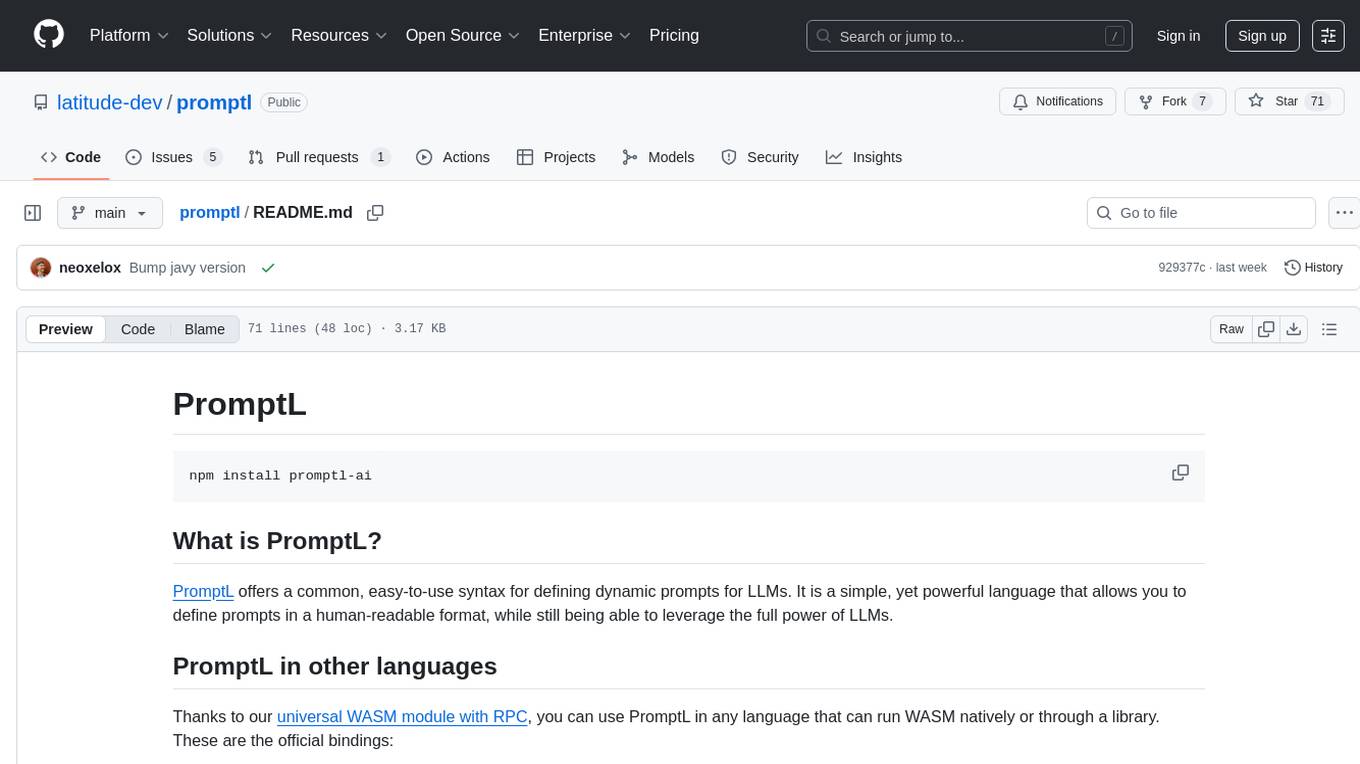
promptl
Promptl is a versatile command-line tool designed to streamline the process of creating and managing prompts for user input in various programming projects. It offers a simple and efficient way to prompt users for information, validate their input, and handle different scenarios based on their responses. With Promptl, developers can easily integrate interactive prompts into their scripts, applications, and automation workflows, enhancing user experience and improving overall usability. The tool provides a range of customization options and features, making it suitable for a wide range of use cases across different programming languages and environments.
For similar tasks

memori
Memori is a lightweight and user-friendly memory management tool for developers. It helps in tracking memory usage, detecting memory leaks, and optimizing memory allocation in software projects. With Memori, developers can easily monitor and analyze memory consumption to improve the performance and stability of their applications. The tool provides detailed insights into memory usage patterns and helps in identifying areas for optimization. Memori is designed to be easy to integrate into existing projects and offers a simple yet powerful interface for managing memory resources effectively.
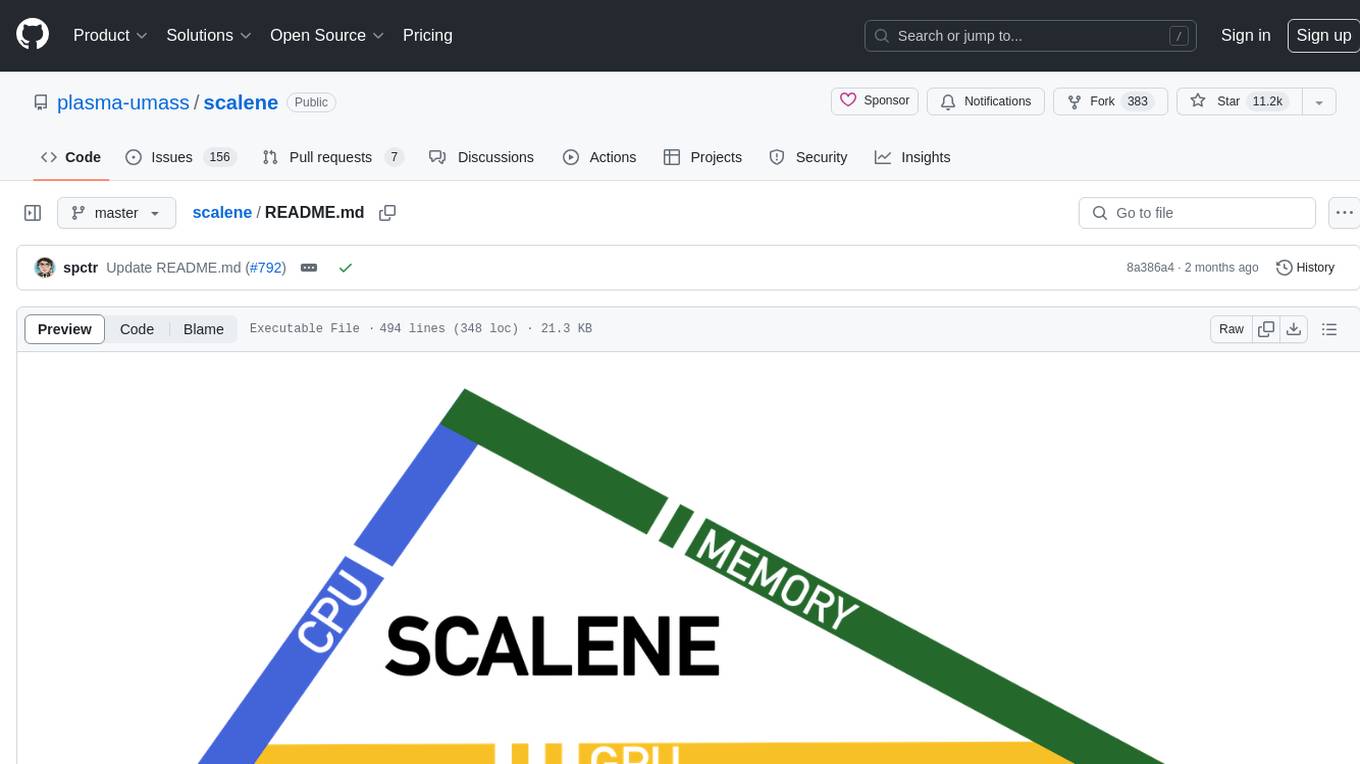
scalene
Scalene is a high-performance CPU, GPU, and memory profiler for Python that provides detailed information and runs faster than many other profilers. It incorporates AI-powered proposed optimizations, allowing users to generate optimization suggestions by clicking on specific lines or regions of code. Scalene separates time spent in Python from native code, highlights hotspots, and identifies memory usage per line. It supports GPU profiling on NVIDIA-based systems and detects memory leaks. Users can generate reduced profiles, profile specific functions using decorators, and suspend/resume profiling for background processes. Scalene is available as a pip or conda package and works on various platforms. It offers features like profiling at the line level, memory trends, copy volume reporting, and leak detection.
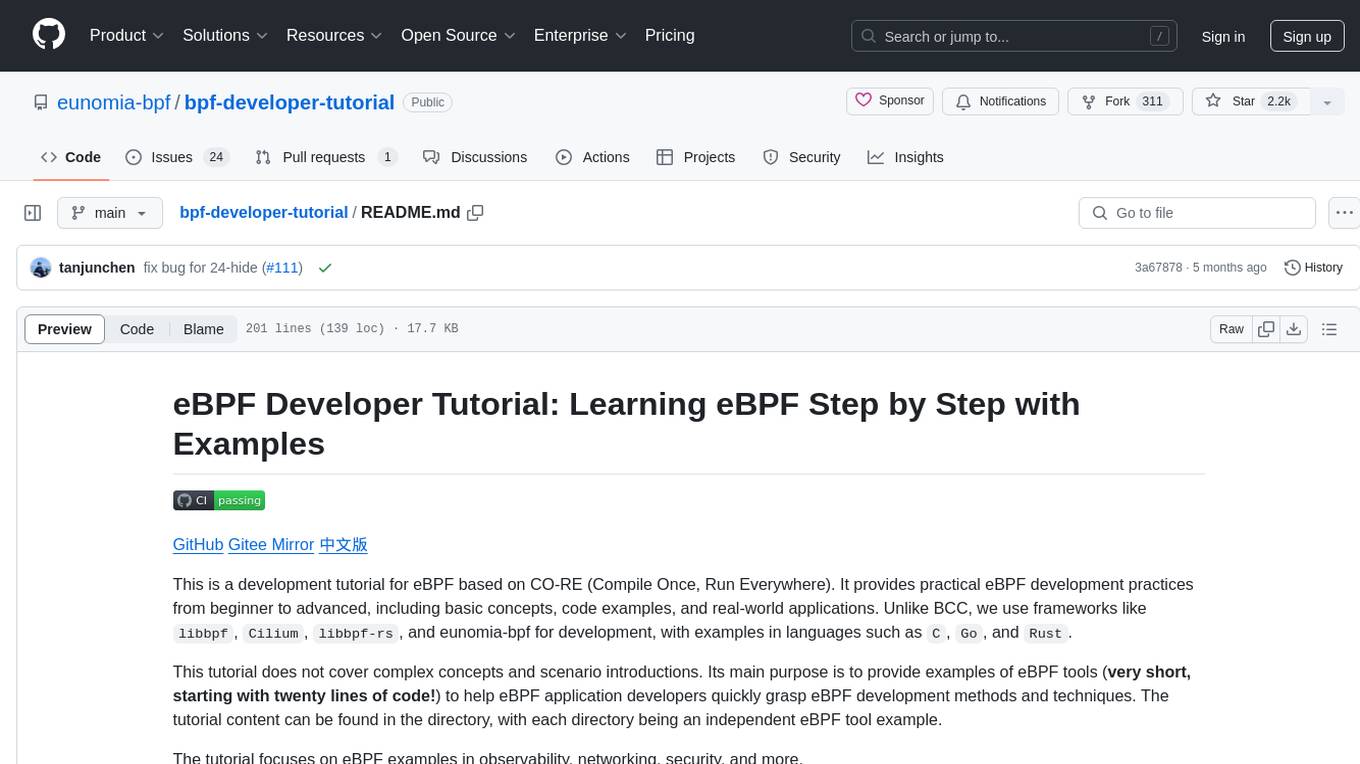
bpf-developer-tutorial
This is a development tutorial for eBPF based on CO-RE (Compile Once, Run Everywhere). It provides practical eBPF development practices from beginner to advanced, including basic concepts, code examples, and real-world applications. The tutorial focuses on eBPF examples in observability, networking, security, and more. It aims to help eBPF application developers quickly grasp eBPF development methods and techniques through examples in languages such as C, Go, and Rust. The tutorial is structured with independent eBPF tool examples in each directory, covering topics like kprobes, fentry, opensnoop, uprobe, sigsnoop, execsnoop, exitsnoop, runqlat, hardirqs, and more. The project is based on libbpf and frameworks like libbpf, Cilium, libbpf-rs, and eunomia-bpf for development.
For similar jobs

kaito
Kaito is an operator that automates the AI/ML inference model deployment in a Kubernetes cluster. It manages large model files using container images, avoids tuning deployment parameters to fit GPU hardware by providing preset configurations, auto-provisions GPU nodes based on model requirements, and hosts large model images in the public Microsoft Container Registry (MCR) if the license allows. Using Kaito, the workflow of onboarding large AI inference models in Kubernetes is largely simplified.

ai-on-gke
This repository contains assets related to AI/ML workloads on Google Kubernetes Engine (GKE). Run optimized AI/ML workloads with Google Kubernetes Engine (GKE) platform orchestration capabilities. A robust AI/ML platform considers the following layers: Infrastructure orchestration that support GPUs and TPUs for training and serving workloads at scale Flexible integration with distributed computing and data processing frameworks Support for multiple teams on the same infrastructure to maximize utilization of resources

tidb
TiDB is an open-source distributed SQL database that supports Hybrid Transactional and Analytical Processing (HTAP) workloads. It is MySQL compatible and features horizontal scalability, strong consistency, and high availability.

nvidia_gpu_exporter
Nvidia GPU exporter for prometheus, using `nvidia-smi` binary to gather metrics.

tracecat
Tracecat is an open-source automation platform for security teams. It's designed to be simple but powerful, with a focus on AI features and a practitioner-obsessed UI/UX. Tracecat can be used to automate a variety of tasks, including phishing email investigation, evidence collection, and remediation plan generation.

openinference
OpenInference is a set of conventions and plugins that complement OpenTelemetry to enable tracing of AI applications. It provides a way to capture and analyze the performance and behavior of AI models, including their interactions with other components of the application. OpenInference is designed to be language-agnostic and can be used with any OpenTelemetry-compatible backend. It includes a set of instrumentations for popular machine learning SDKs and frameworks, making it easy to add tracing to your AI applications.

BricksLLM
BricksLLM is a cloud native AI gateway written in Go. Currently, it provides native support for OpenAI, Anthropic, Azure OpenAI and vLLM. BricksLLM aims to provide enterprise level infrastructure that can power any LLM production use cases. Here are some use cases for BricksLLM: * Set LLM usage limits for users on different pricing tiers * Track LLM usage on a per user and per organization basis * Block or redact requests containing PIIs * Improve LLM reliability with failovers, retries and caching * Distribute API keys with rate limits and cost limits for internal development/production use cases * Distribute API keys with rate limits and cost limits for students

kong
Kong, or Kong API Gateway, is a cloud-native, platform-agnostic, scalable API Gateway distinguished for its high performance and extensibility via plugins. It also provides advanced AI capabilities with multi-LLM support. By providing functionality for proxying, routing, load balancing, health checking, authentication (and more), Kong serves as the central layer for orchestrating microservices or conventional API traffic with ease. Kong runs natively on Kubernetes thanks to its official Kubernetes Ingress Controller.


